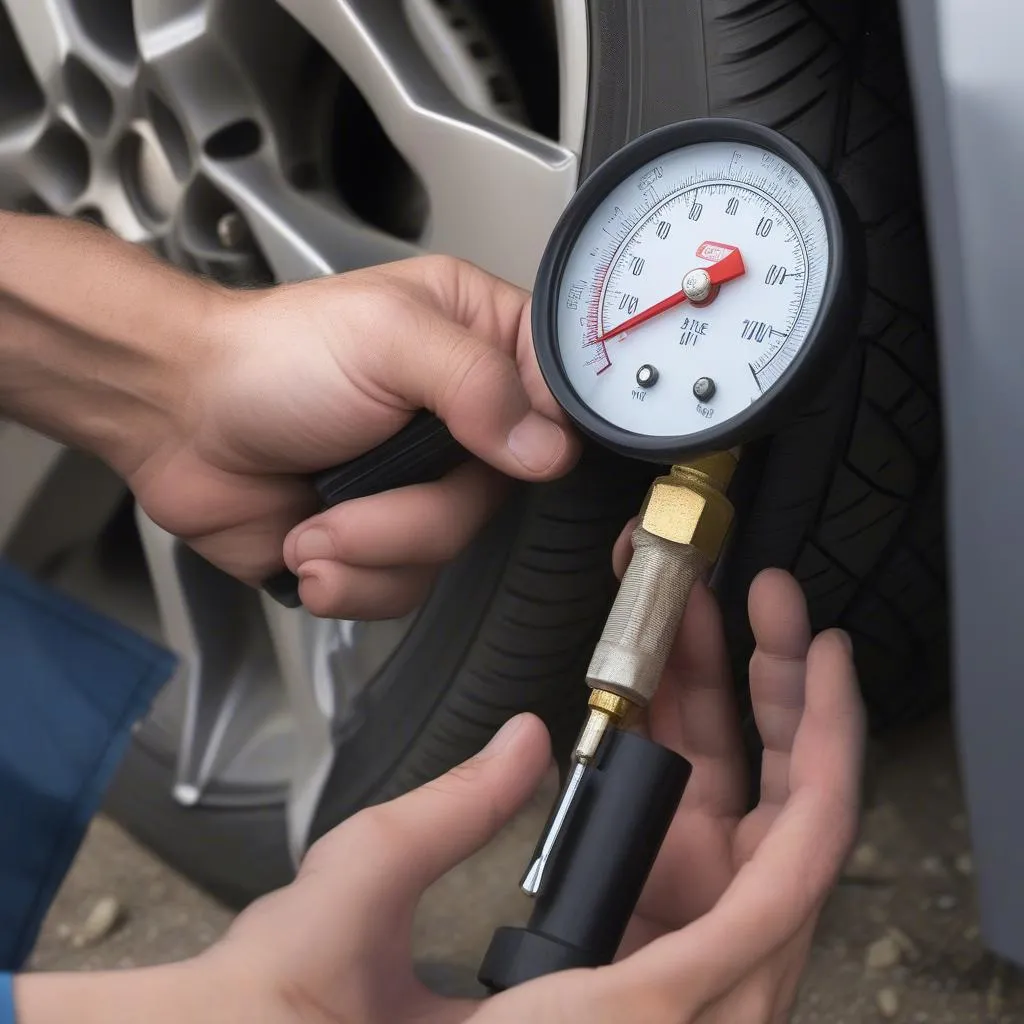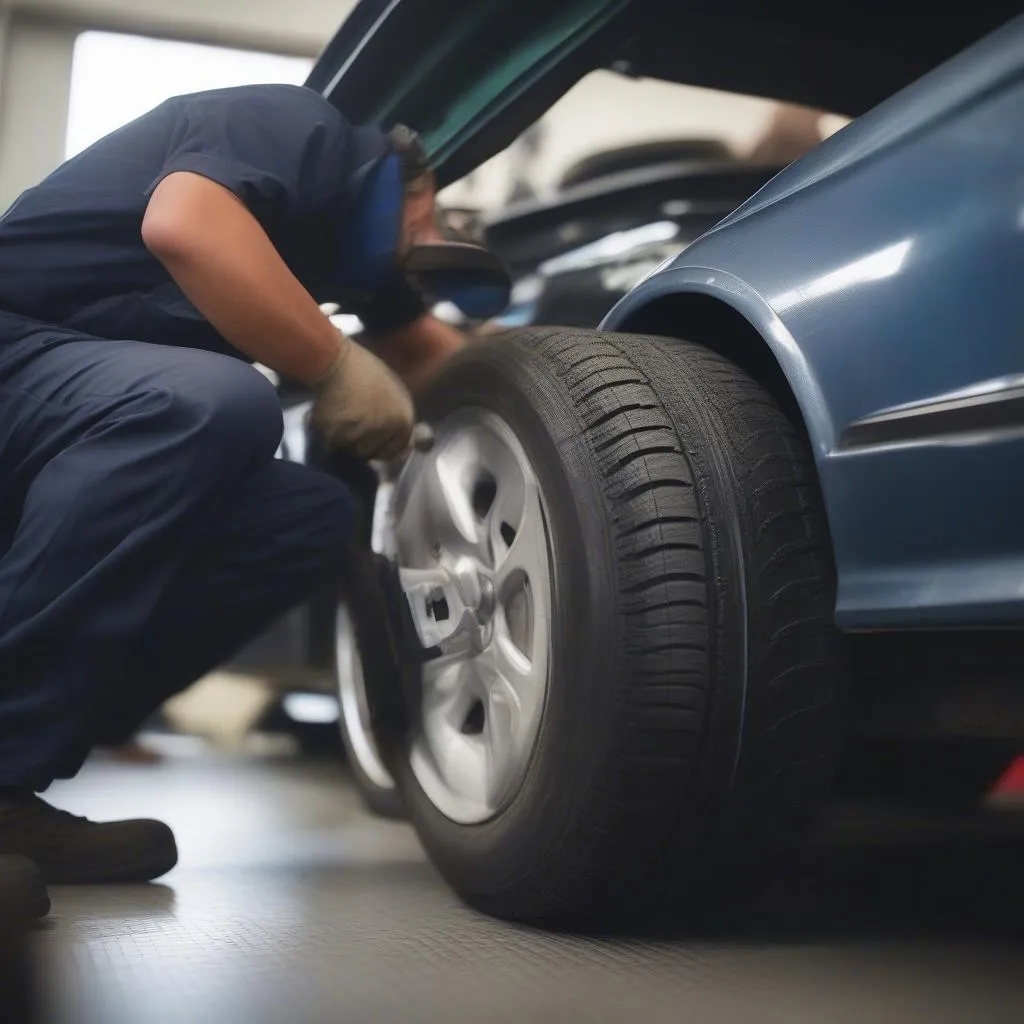Have you ever felt a strange vibration in your car, especially at higher speeds? It can be disconcerting, and you might wonder if it’s a sign of something serious. You’re not alone. Many car owners experience this, and a common culprit might be your tires. But can old tires really cause vibration? Let’s find out!
What Does It Mean?
The question, “Can old tires cause vibration?” is actually a complex one. There’s no single answer, as the issue involves several contributing factors. From a car mechanic’s perspective, it’s important to consider the age of the tires, the type of wear and tear they’ve experienced, and the overall condition of the car.
Technical Perspective:
Old tires, especially those nearing the end of their recommended lifespan, can lose their structural integrity and become less stable. This can manifest in a number of ways:
- Uneven Wear: As tires age, they may wear down unevenly. This uneven wear can lead to vibrations, particularly at high speeds.
- Loss of Tread Depth: The tread depth of your tires is crucial for maintaining grip and stability. Over time, the tread wears down, affecting the tire’s ability to absorb bumps and irregularities in the road, leading to vibrations.
- Sidewall Damage: Sidewalls of tires can become brittle and prone to cracking with age. This can lead to poor handling and vibrations.
- Internal Components: The internal components of the tire, like the belts and plies, can deteriorate over time, leading to weakened tire structure and vibrations.
Economic Perspective:
Replacing worn-out tires is an expense that many car owners may try to avoid. However, delaying tire replacement can lead to further damage and repair costs. Vibrations caused by old tires can worsen other problems, such as wheel bearing issues, suspension damage, and even premature brake wear. In the long run, prioritizing tire maintenance can actually save you money.
Is It True?
Yes, old tires can indeed cause vibrations. However, it’s important to note that other factors can also contribute.
Common Scenarios:
- Driving on Rough Roads: Driving regularly on rough or uneven roads can accelerate the wear and tear on your tires, even if they’re relatively new.
- Improper Alignment: Misaligned wheels can cause uneven tire wear, leading to vibrations.
- Wheel Balance: Unbalanced wheels can also cause vibrations, regardless of the age of the tires.
- Suspension Issues: Worn-out suspension components, such as shocks, struts, or control arm bushings, can also contribute to vibrations.
What to Do?
If you’re experiencing vibrations, the first step is to consult a mechanic. They can assess the age and condition of your tires, as well as check other components that might be causing the issue.
Expert Advice:
“It’s crucial to remember that tires have a lifespan, and exceeding that can be detrimental to your vehicle,” advises renowned German automotive expert, Dr. Karl Schmidt. “While tire age is a key factor, other aspects, like driving conditions and maintenance, also contribute to their performance.”
Common Questions:
Q: How do I know if my tires are too old?
A: Most tire manufacturers recommend replacing tires after 6 years, regardless of tread depth. However, it’s important to check the sidewall of the tire for a date code, which indicates the manufacturing date.
Q: What are the signs that my tires need to be replaced?
A: Besides vibration, other signs include uneven wear, cracks in the sidewalls, low tread depth, and bulges or punctures.
Q: Can I mix old and new tires?
A: It’s generally not recommended to mix old and new tires, as this can lead to uneven wear and handling issues.
Q: How often should I rotate my tires?
A: It’s recommended to rotate your tires every 5,000 to 8,000 miles to ensure even wear.
Q: What is the best way to maintain my tires?
A: Regular tire pressure checks, proper alignment, and avoiding harsh driving habits can help to extend the life of your tires.
Looking for More Information?
For further insights into car vibrations, explore these resources:
- https://diagxcar.com/my-car-shakes-when-i-accelerate-over-50-mph/
- https://diagxcar.com/car-shudders-while-accelerating/
- https://diagxcar.com/car-shakes-when-trying-to-start/
- https://diagxcar.com/car-feels-shaky-when-stopped/
- https://diagxcar.com/will-a-bad-alignment-cause-vibration/
Conclusion:
While old tires can contribute to vibrations, the issue is often multifaceted. Regular tire maintenance, including checks for age and wear, is crucial for your vehicle’s safety and performance. If you suspect tire-related problems, it’s always best to consult a qualified mechanic.
Want to stay ahead of car problems and diagnose issues easily? Contact us at Whatsapp: +84767531508 for expert support and diagnostics tool setup. We offer 24/7 assistance from our team of experienced mechanics.
Let us know in the comments if you have any further questions or if you’d like to share your own experiences with tire vibrations!
 Tire Pressure Gauge
Tire Pressure Gauge
 Tire Rotation
Tire Rotation